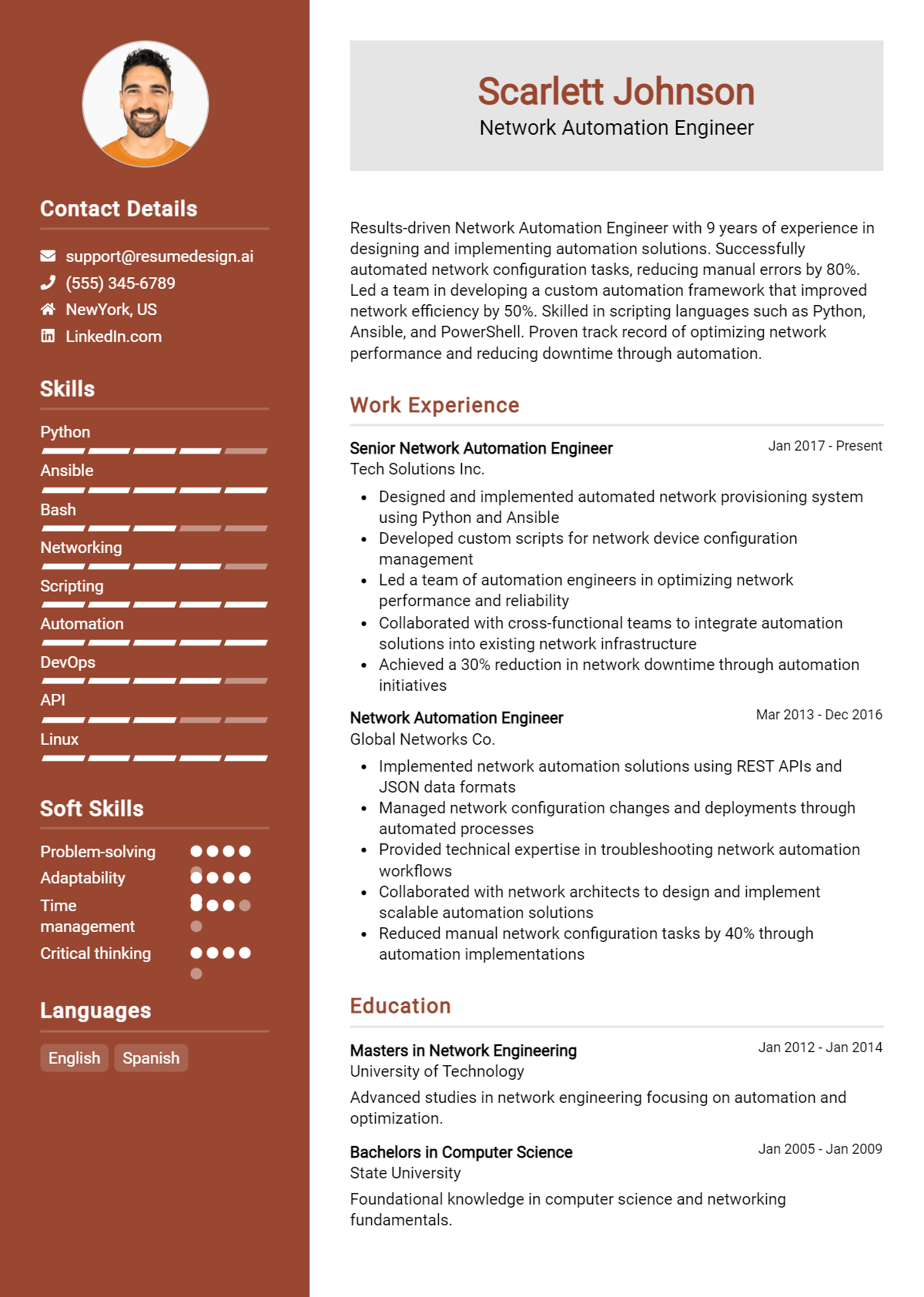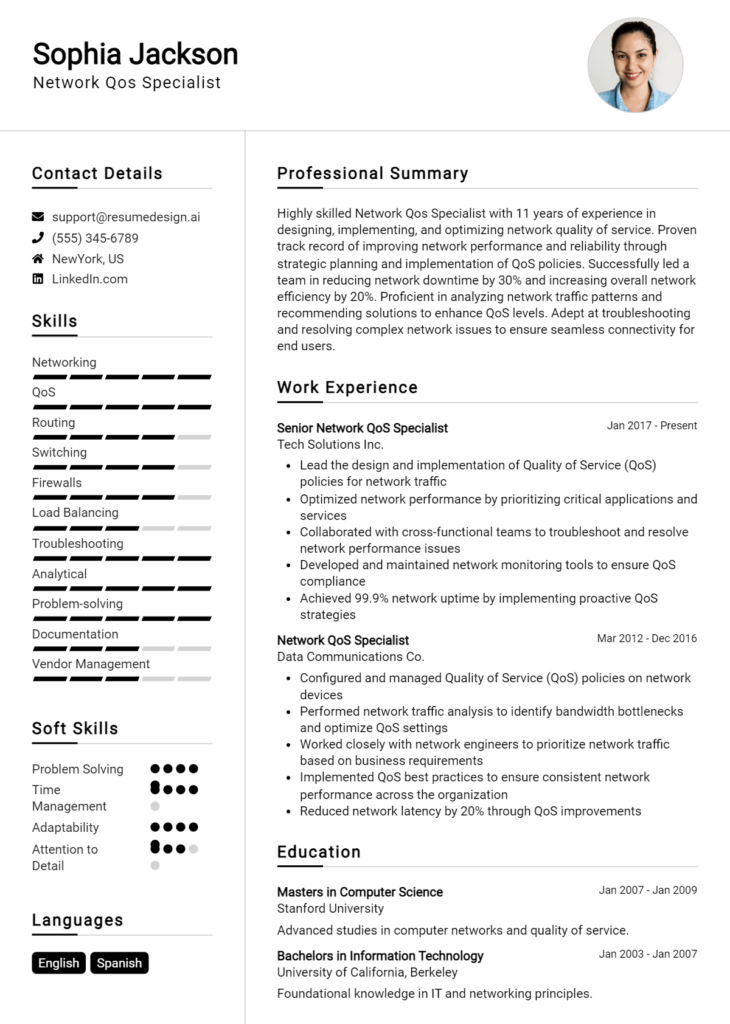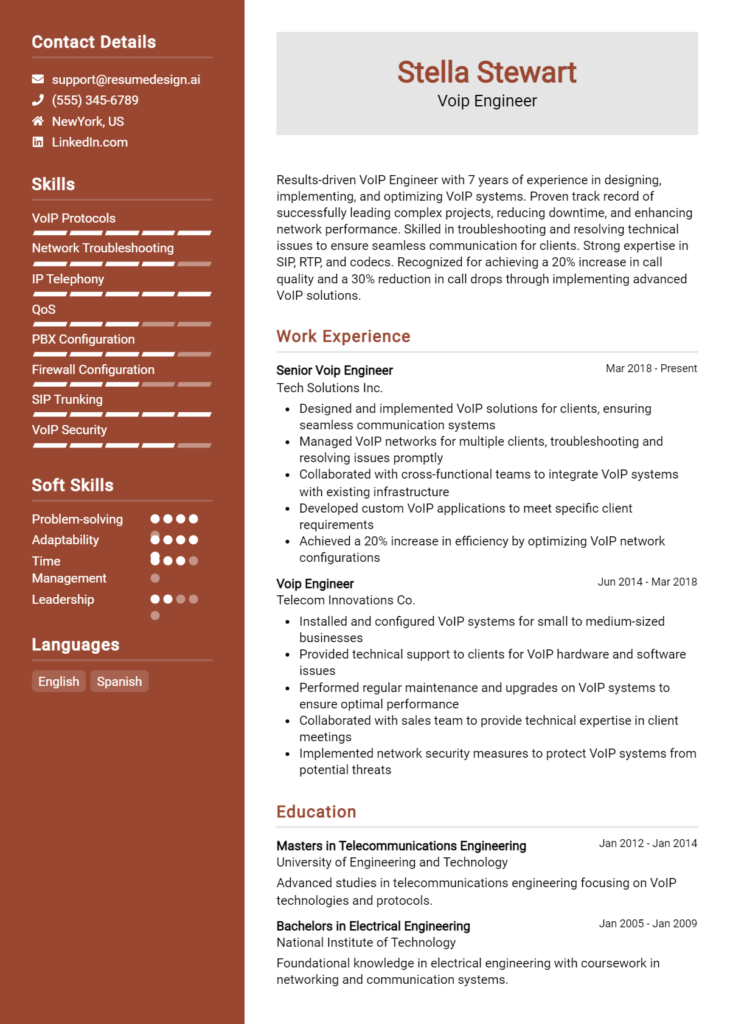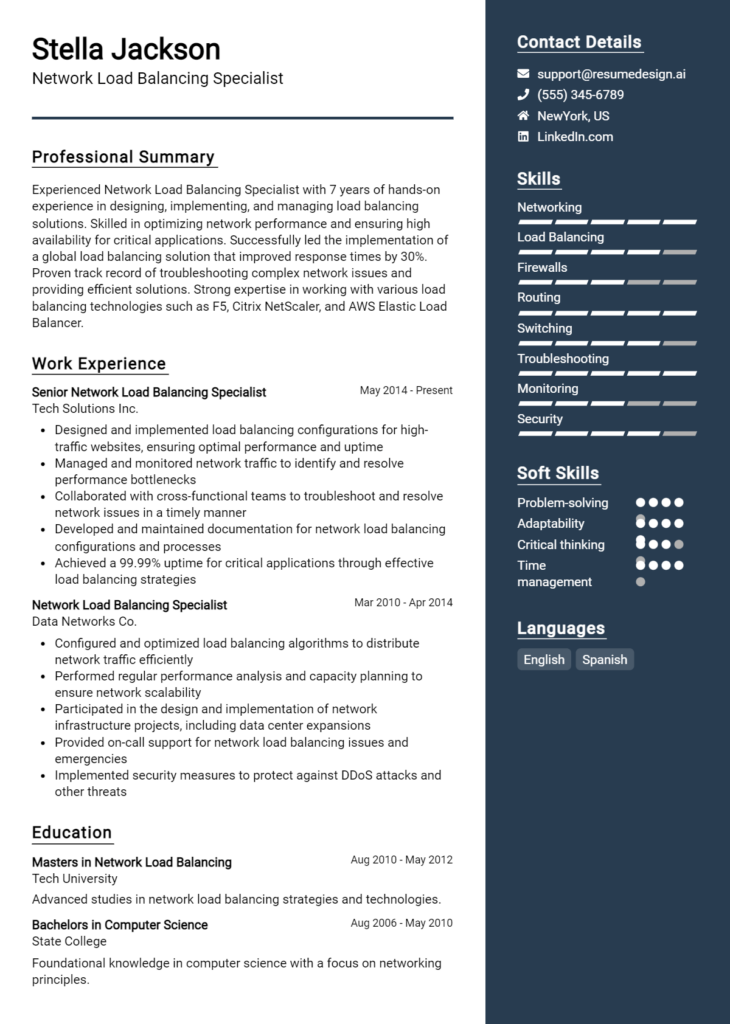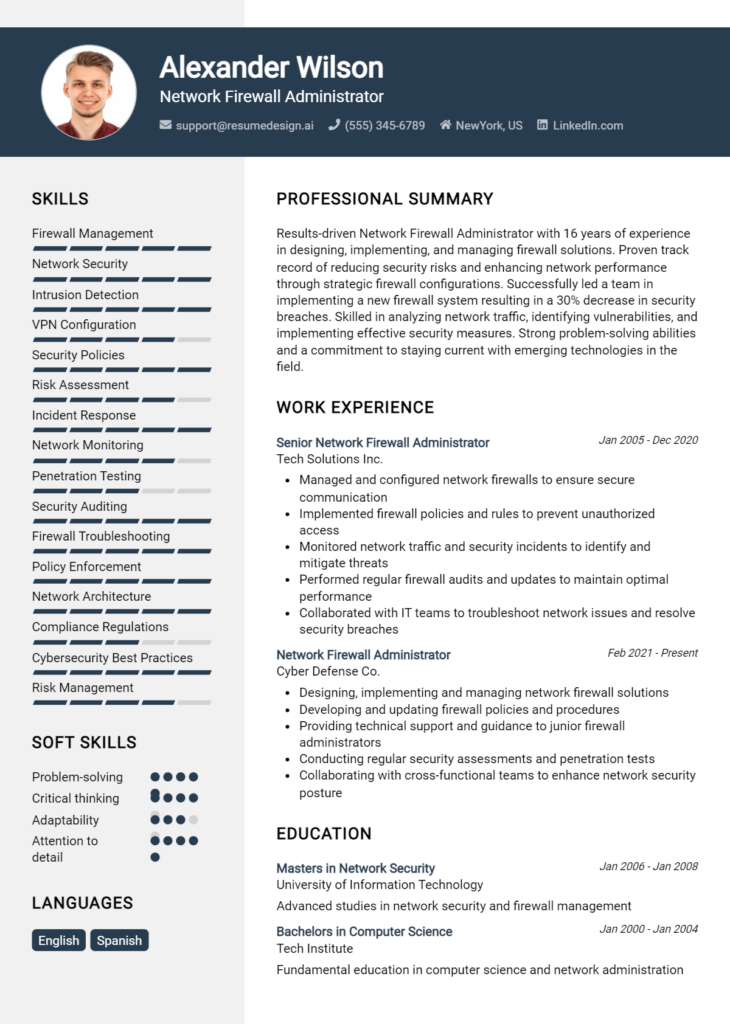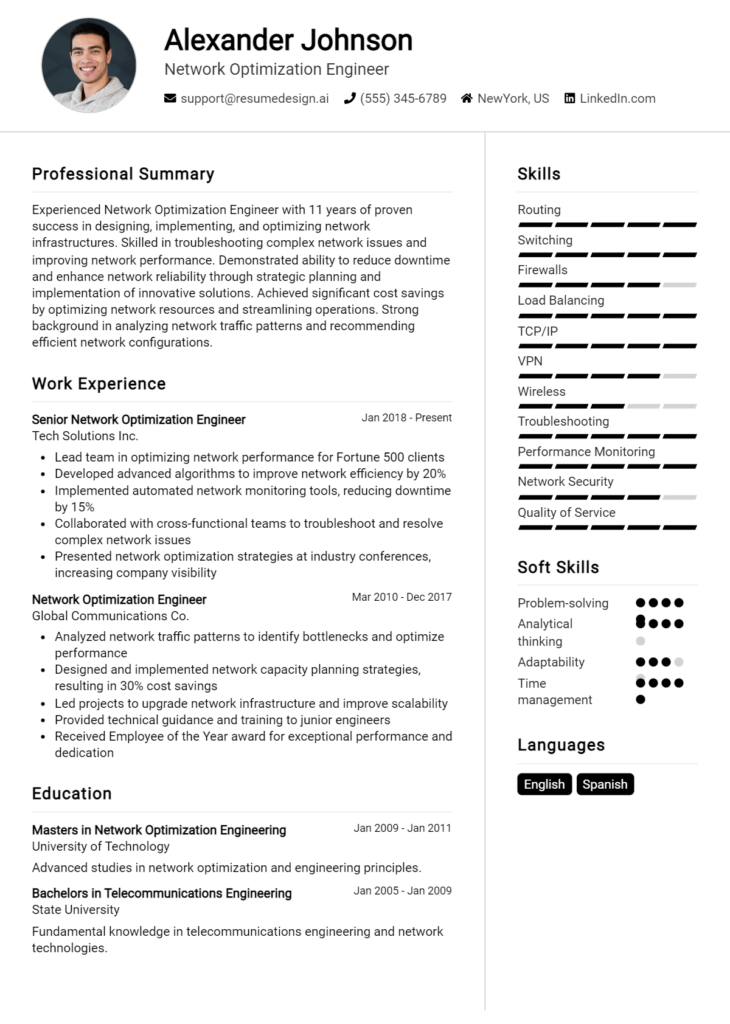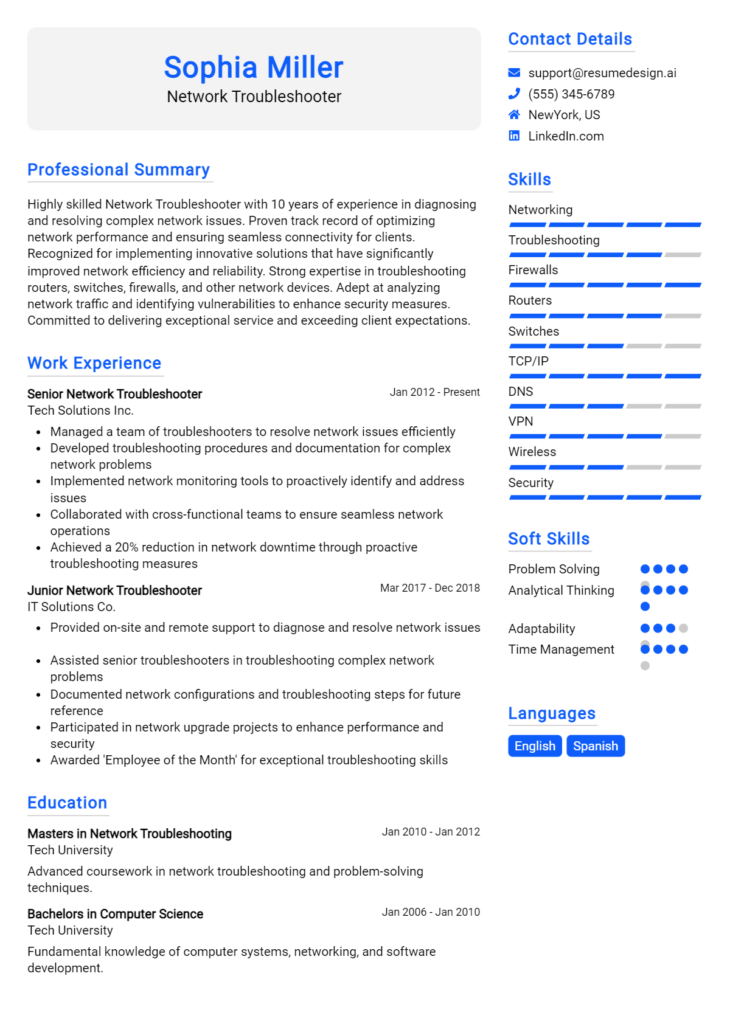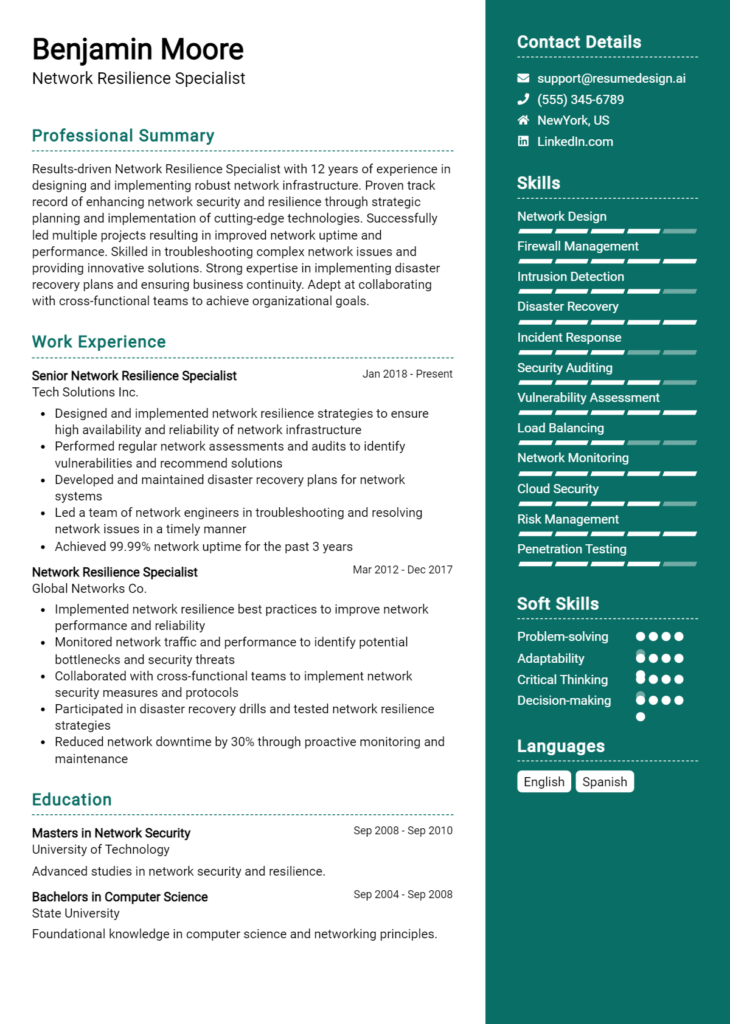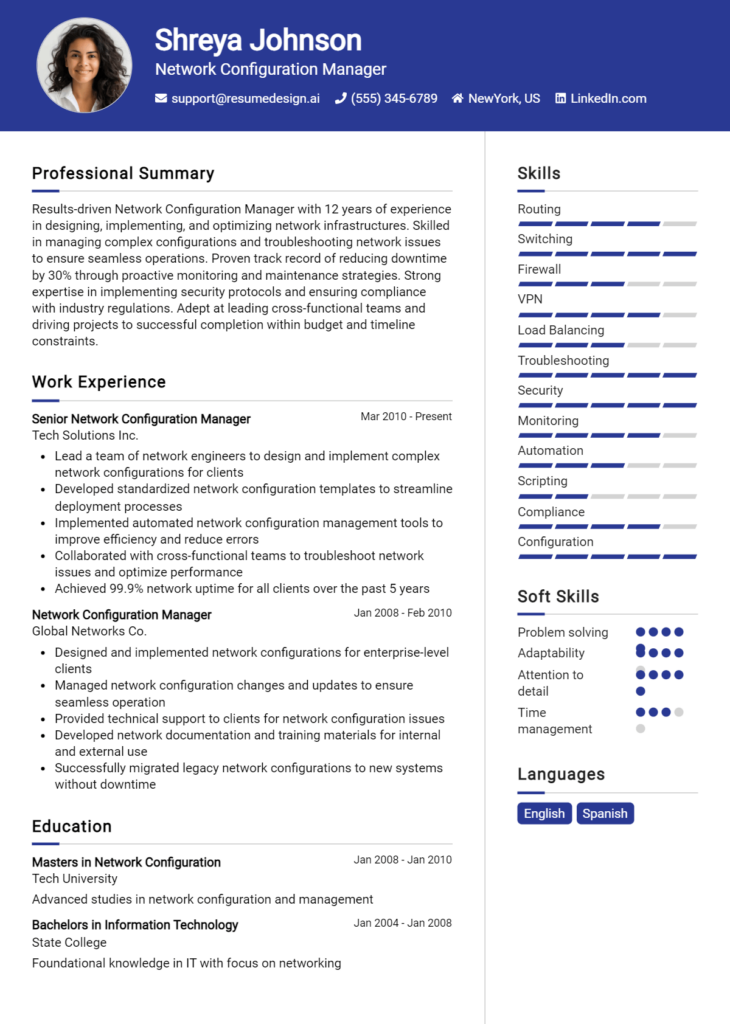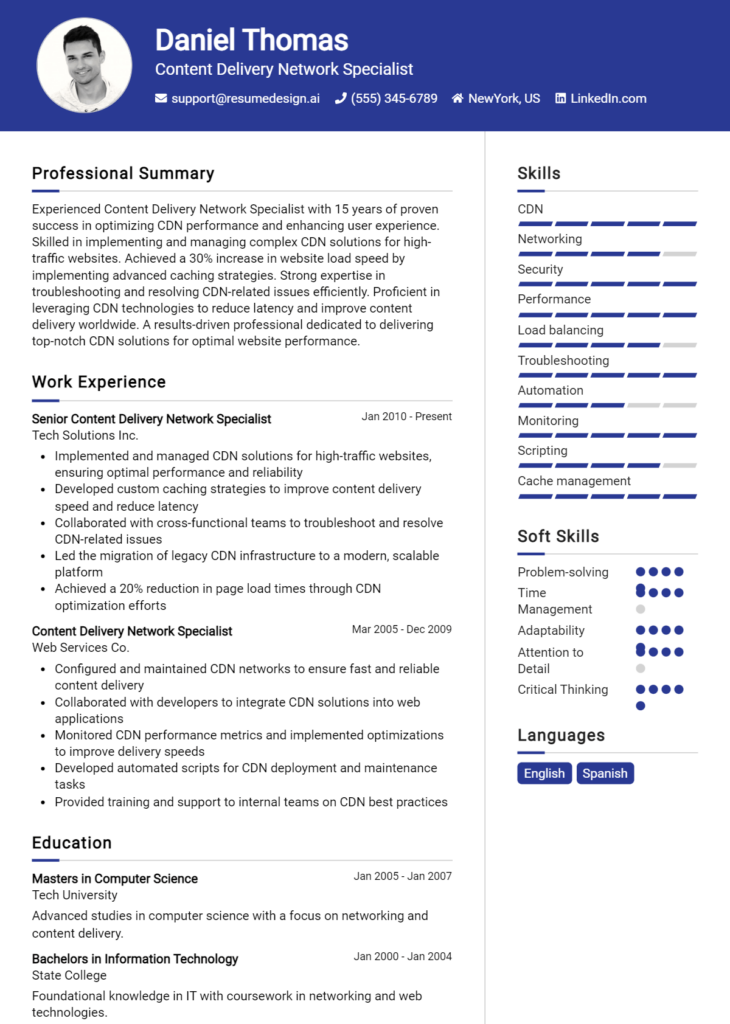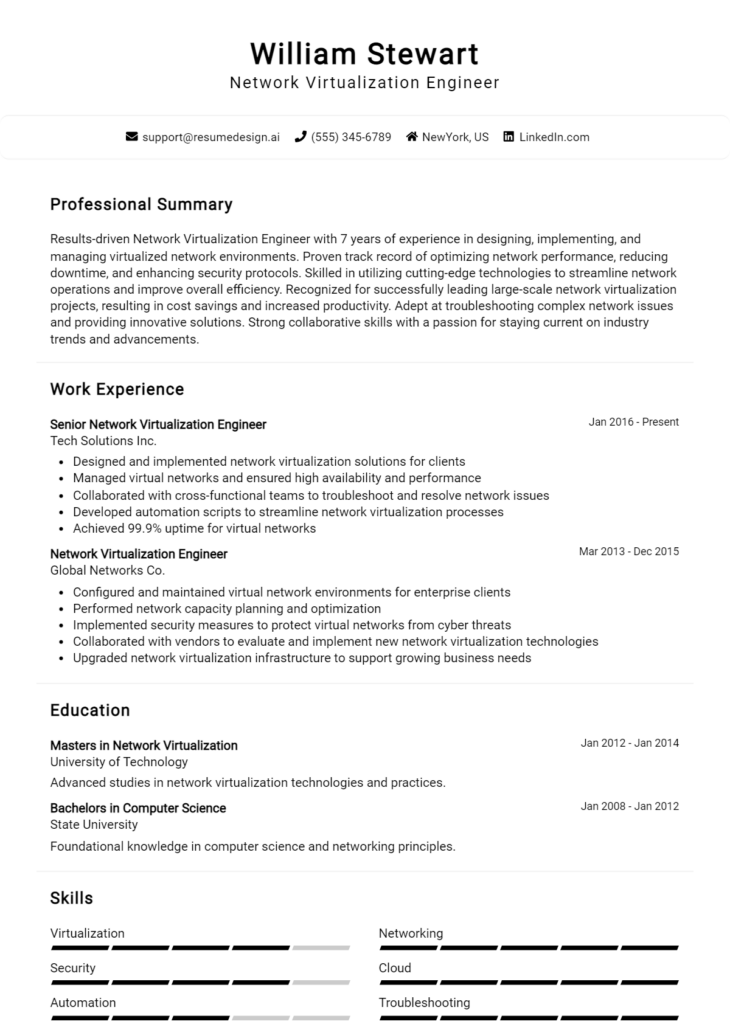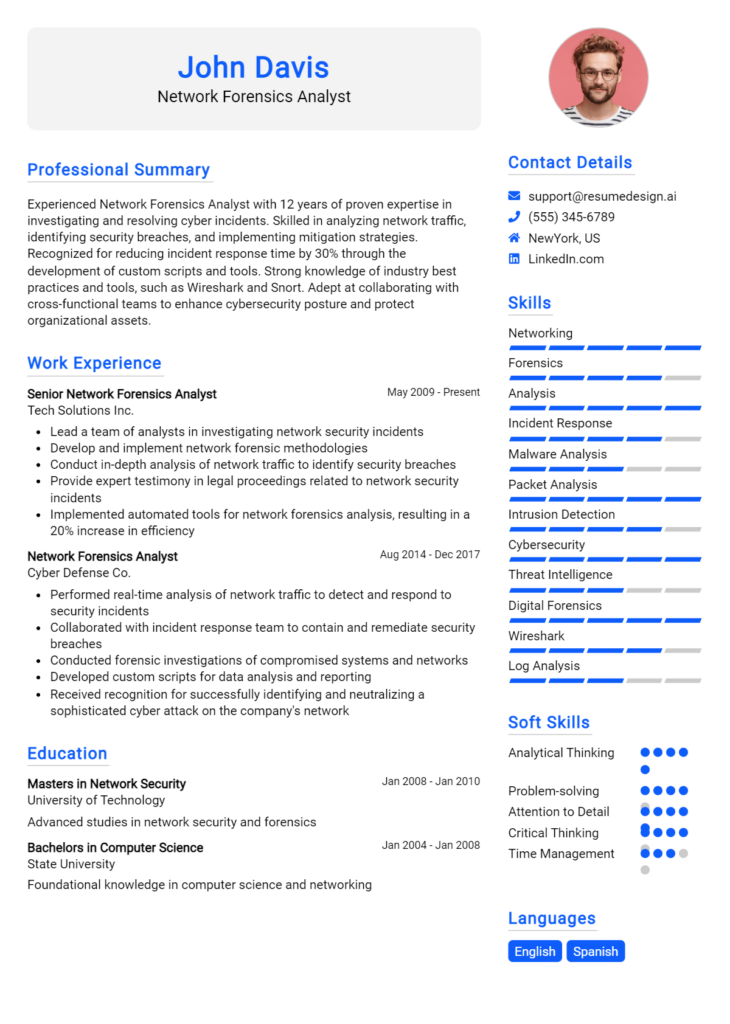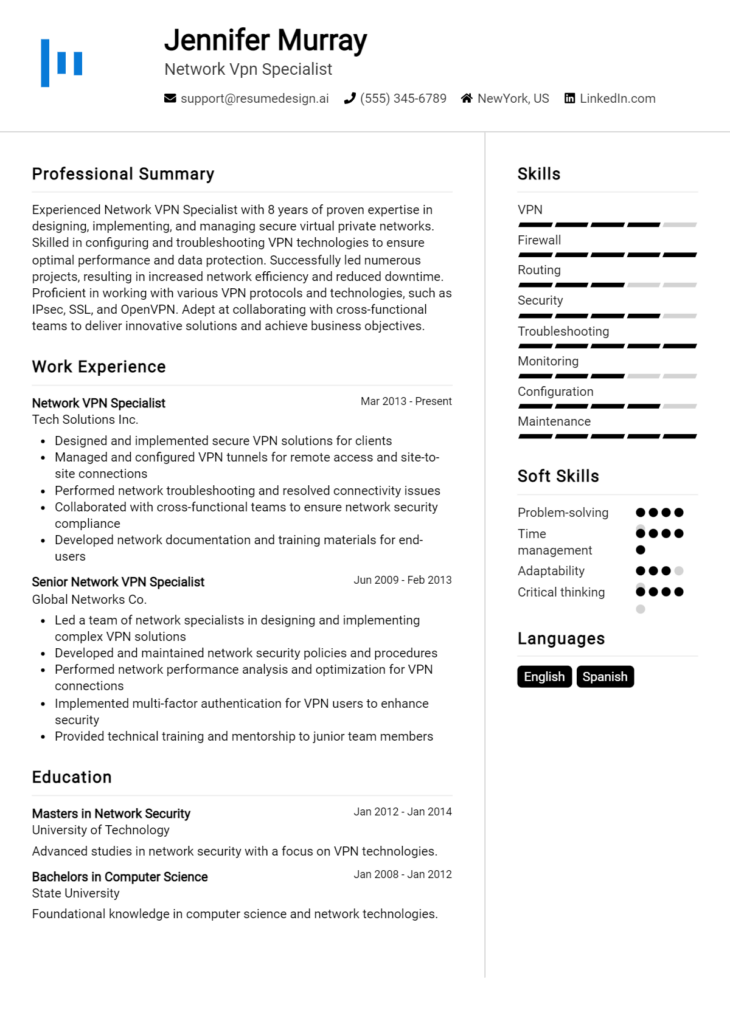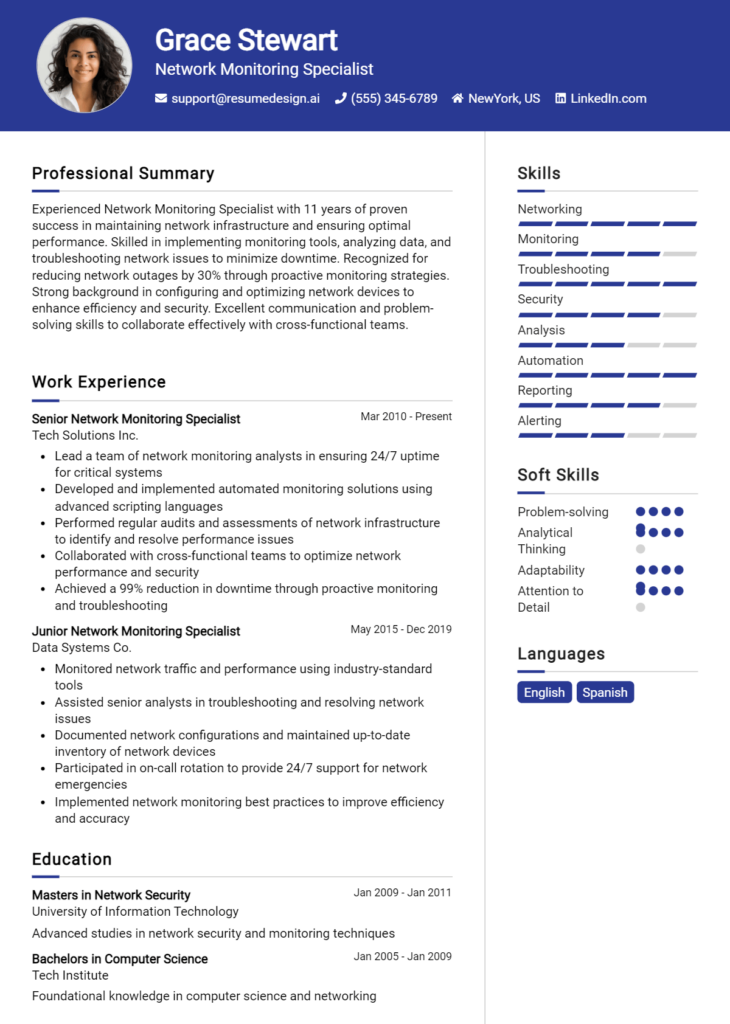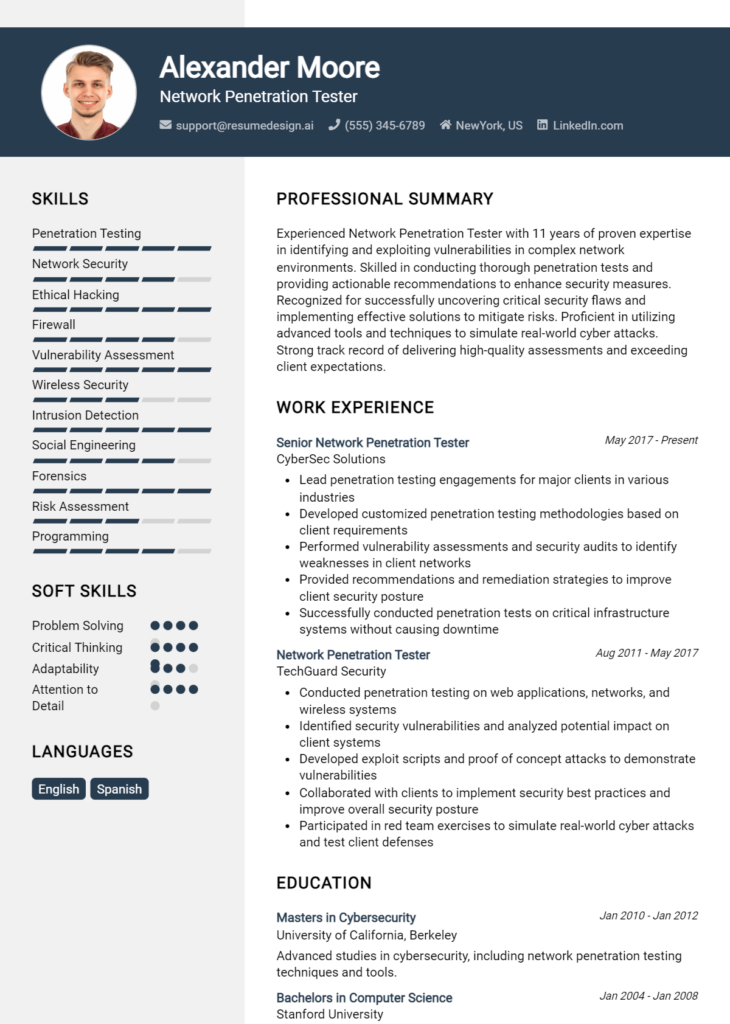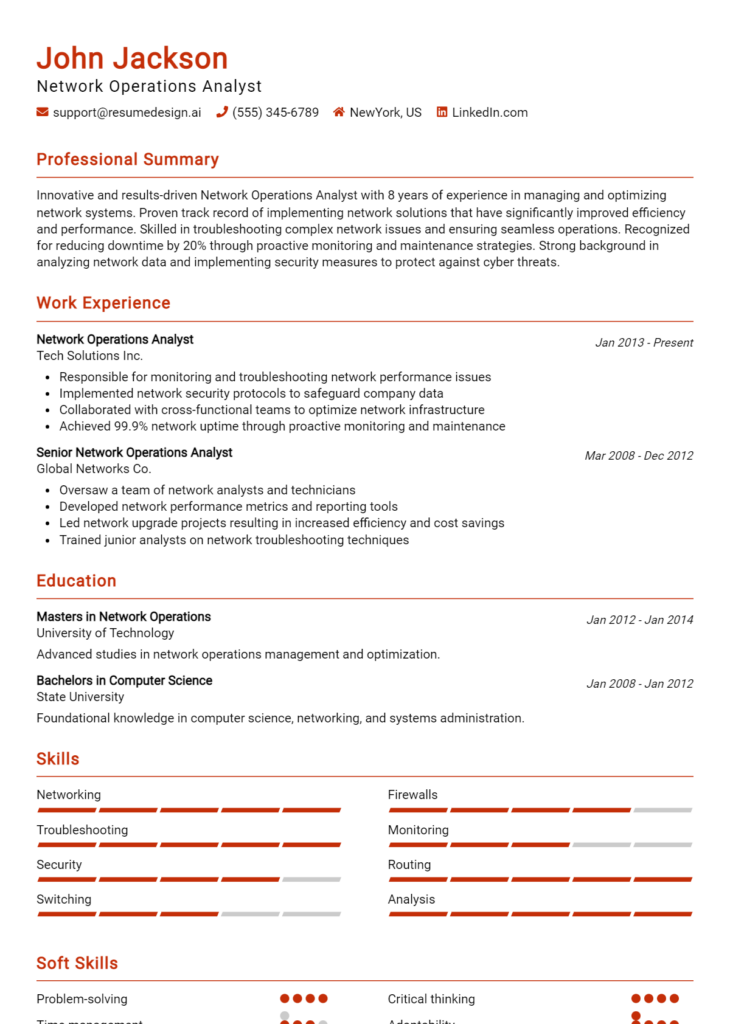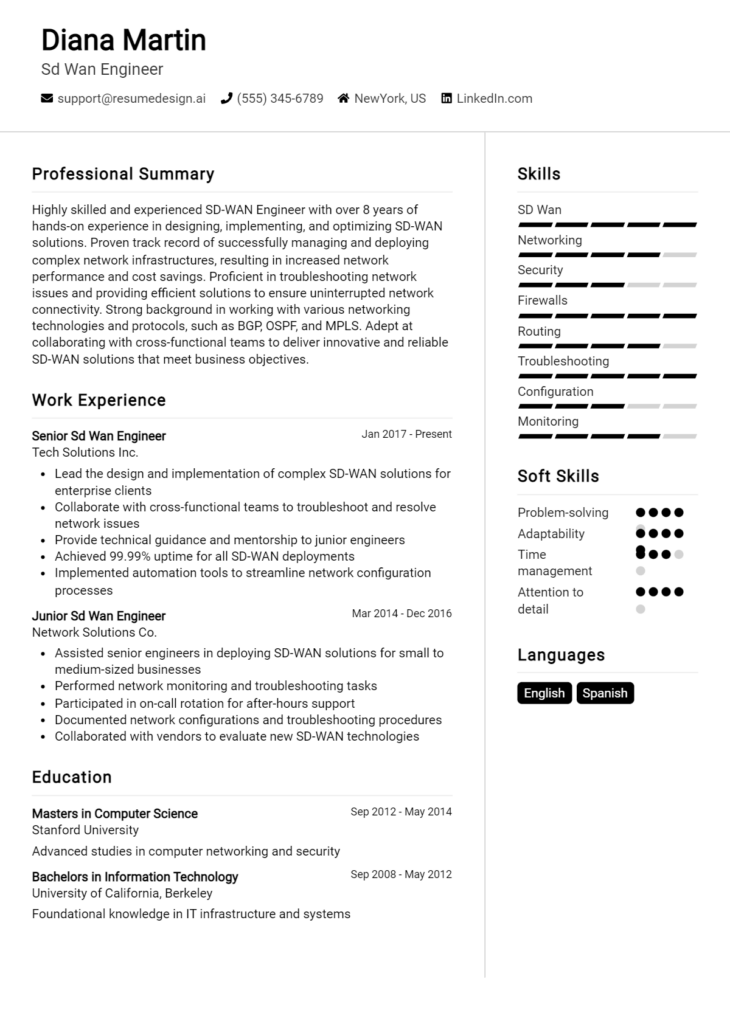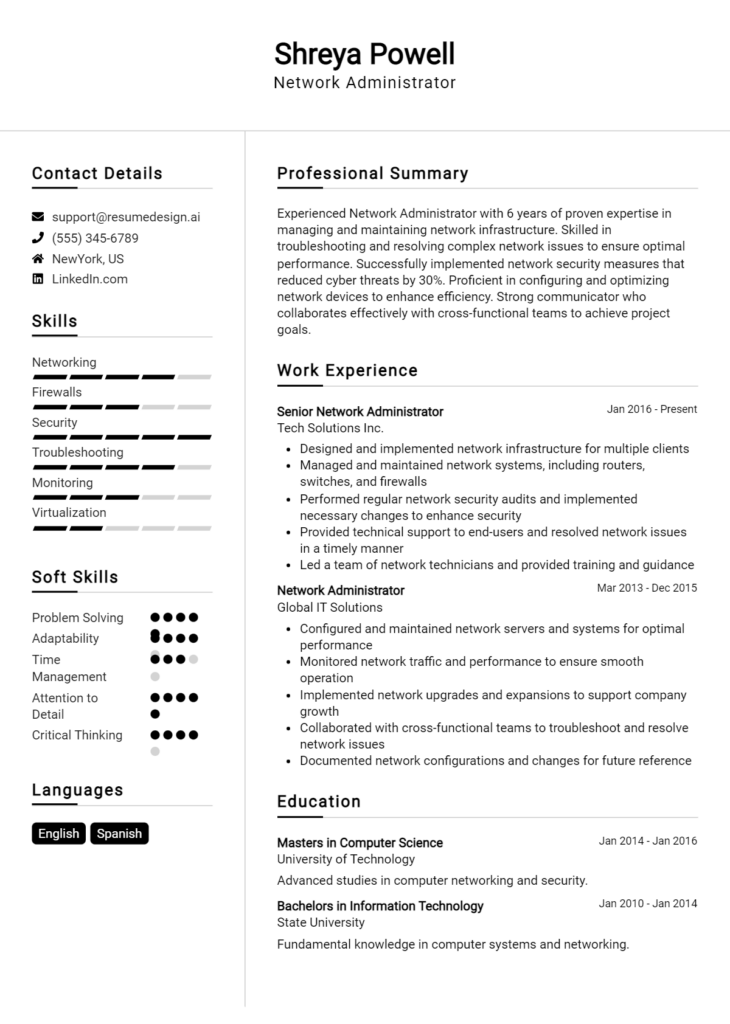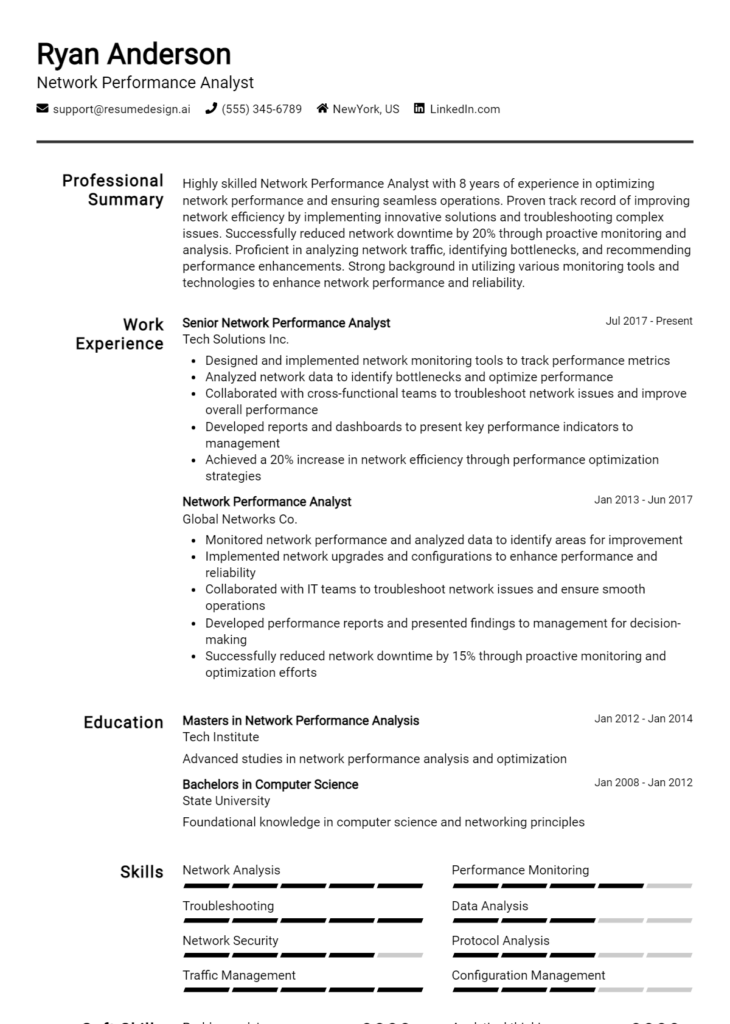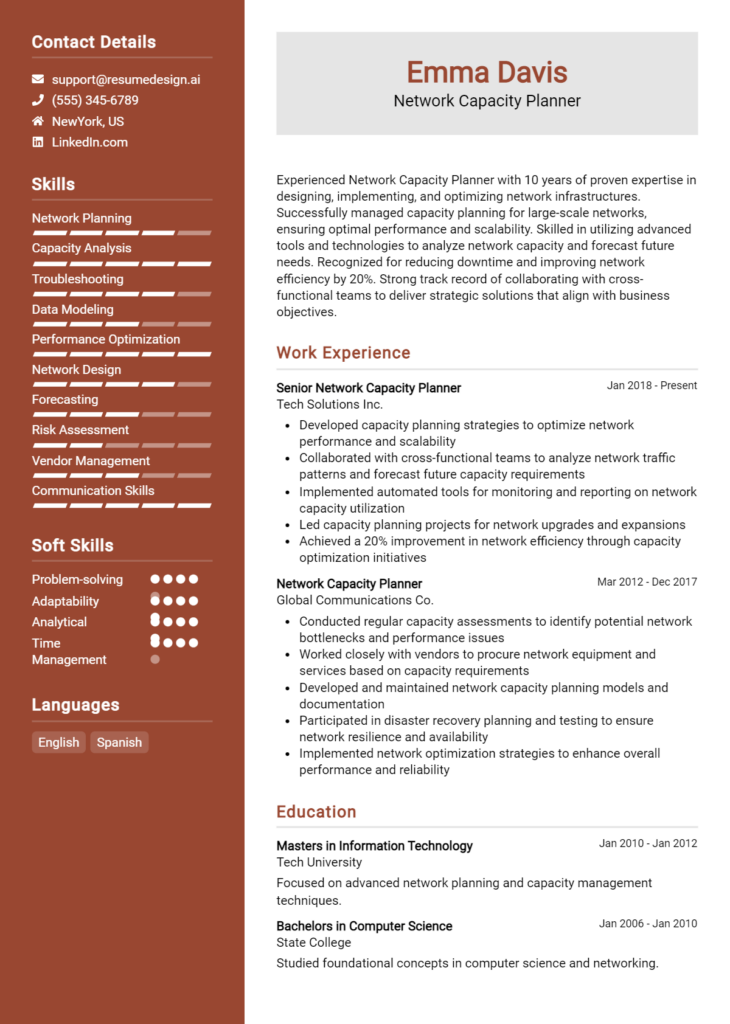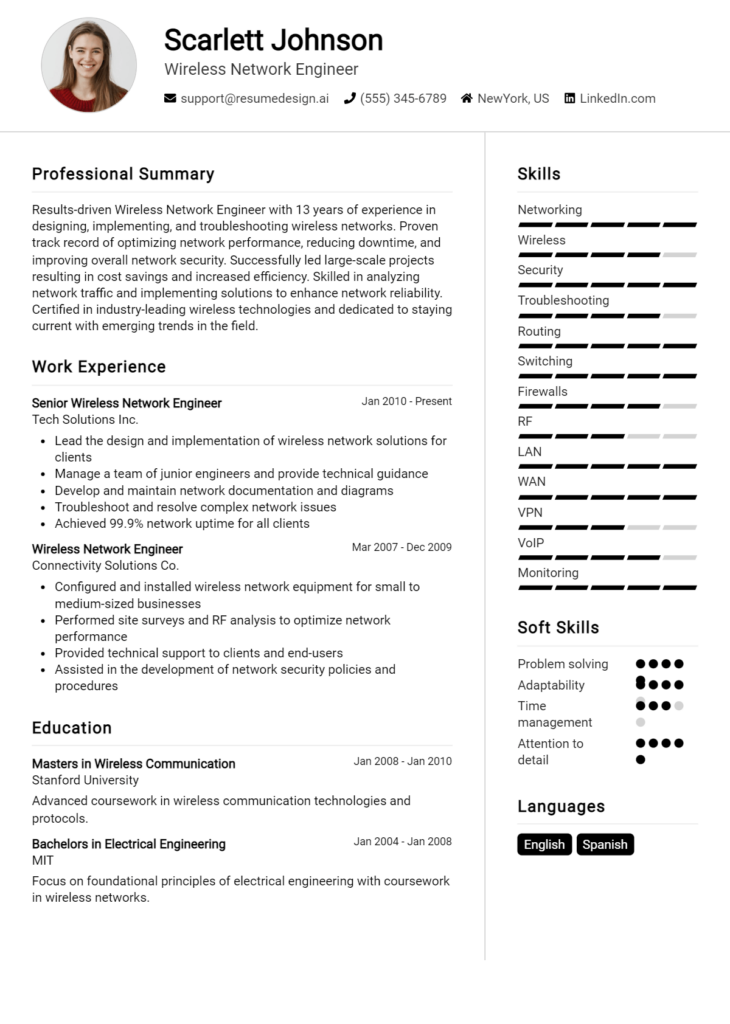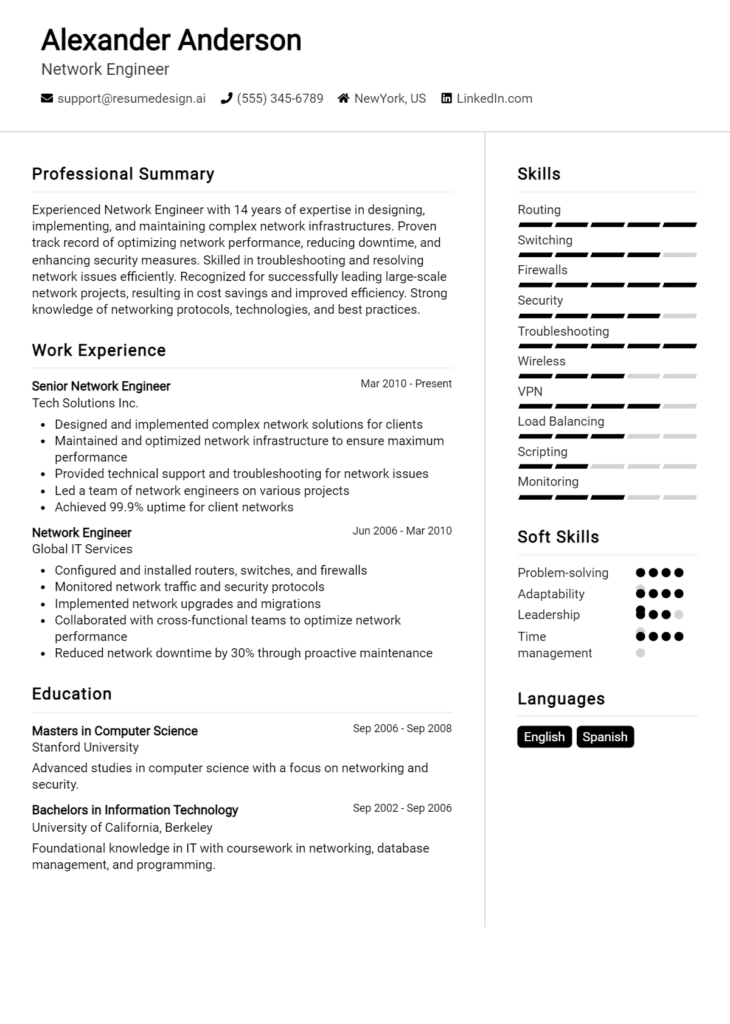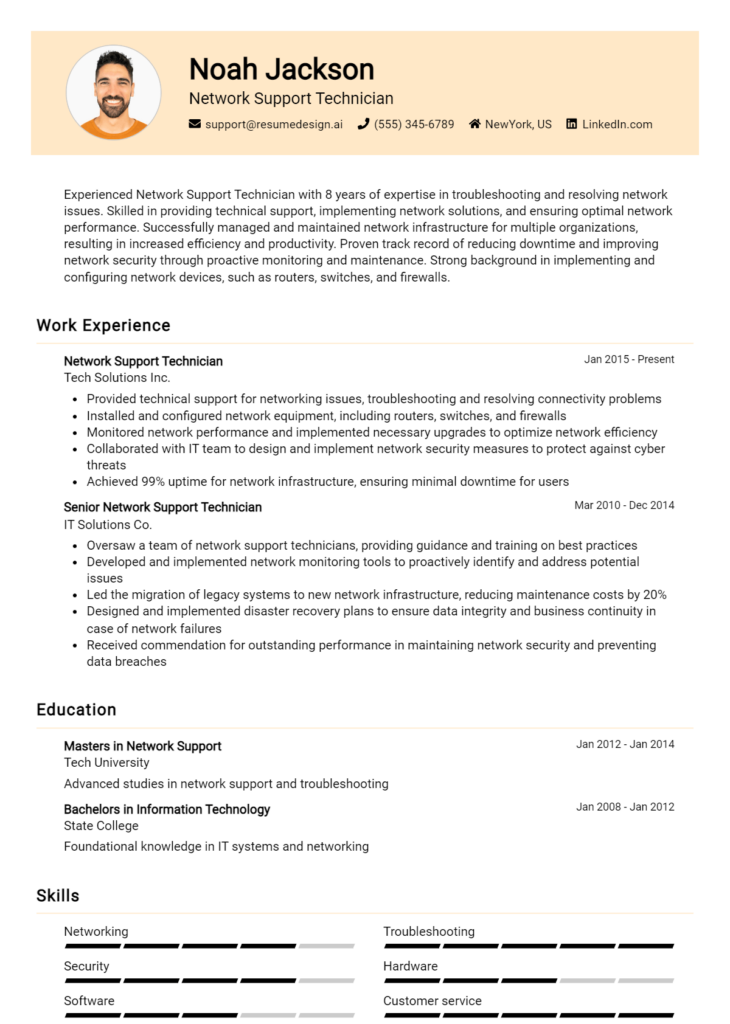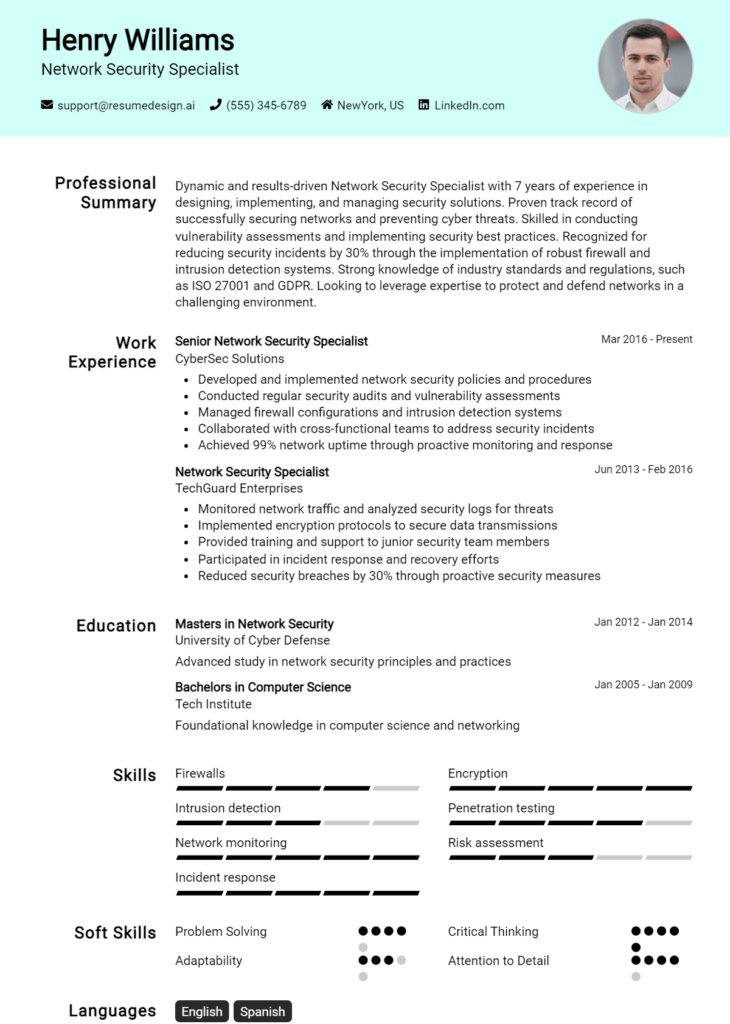Network Automation Engineer Core Responsibilities
A Network Automation Engineer plays a pivotal role in enhancing operational efficiency by automating network management tasks. This professional must possess strong technical skills, such as proficiency in scripting languages (e.g., Python, Ansible) and networking protocols, alongside operational expertise in network design and troubleshooting. Excellent problem-solving abilities are crucial for addressing complex issues that arise. By bridging IT and operations, this role ensures seamless communication across departments, ultimately contributing to the organization's strategic objectives. A well-structured resume that highlights these qualifications can significantly enhance job prospects.
Common Responsibilities Listed on Network Automation Engineer Resume
- Design and implement automated network solutions to improve efficiency.
- Develop and maintain scripts for network configuration and monitoring.
- Collaborate with cross-functional teams to define automation requirements.
- Troubleshoot network issues and optimize performance through automation.
- Monitor network infrastructure for faults and performance metrics.
- Document network automation processes and best practices.
- Integrate network automation tools with existing systems.
- Conduct training sessions for staff on network automation technologies.
- Stay updated with industry trends and emerging technologies.
- Ensure compliance with security policies in automated processes.
- Participate in network design reviews and capacity planning.
High-Level Resume Tips for Network Automation Engineer Professionals
In the highly competitive field of network automation engineering, a well-crafted resume serves as your ticket to standing out among a pool of qualified candidates. It is often the first impression a potential employer has of you, and it must effectively showcase not only your technical skills but also your accomplishments within the industry. A compelling resume can open doors to interviews and opportunities that might otherwise be missed. This guide will provide practical and actionable tips specifically tailored for Network Automation Engineer professionals, helping you to craft a resume that truly reflects your expertise and achievements.
Top Resume Tips for Network Automation Engineer Professionals
- Tailor your resume to match the job description, using keywords and phrases that align with the specific requirements of the position.
- Highlight relevant experience in network automation tools and frameworks, such as Ansible, Puppet, or Cisco DNA Center.
- Quantify your achievements by including metrics that demonstrate the impact of your work, such as time saved or efficiency gains.
- Showcase your proficiency in scripting languages such as Python or Bash, emphasizing how you've used them to automate tasks.
- Include certifications relevant to network automation, such as Cisco CCNA, CCNP, or DevNet certifications, to validate your expertise.
- Demonstrate your problem-solving skills by detailing specific challenges you've faced and how you successfully addressed them.
- Incorporate projects or initiatives where you led automation efforts, illustrating your leadership and initiative in enhancing network operations.
- Utilize a clean, professional format that enhances readability and draws attention to key sections of your resume.
- Keep your resume concise; aim for one page if you have less than ten years of experience, and two pages if you have more extensive experience.
- Proofread your resume thoroughly to eliminate any errors, as attention to detail is crucial in the technical field.
By implementing these tips, you can significantly increase your chances of landing a job in the Network Automation Engineer field. A focused and well-structured resume not only highlights your skills and achievements but also demonstrates your commitment to excellence, making you a strong contender in a competitive job market.
Why Resume Headlines & Titles are Important for Network Automation Engineer
In the competitive field of network automation engineering, a well-crafted resume headline or title plays a crucial role in capturing the attention of hiring managers. A strong headline serves as a powerful first impression, providing a succinct summary of a candidate's key qualifications in one impactful phrase. By being concise, relevant, and directly related to the job being applied for, an effective headline can immediately convey a candidate's value and set them apart from others. This is particularly important in a technical domain where hiring managers often sift through numerous resumes, making the need for a distinctive and relevant title essential for success.
Best Practices for Crafting Resume Headlines for Network Automation Engineer
- Keep it concise: Aim for one impactful sentence that sums up your qualifications.
- Be specific: Use keywords related to network automation that align with the job description.
- Highlight key skills: Focus on your most relevant technical skills and certifications.
- Showcase accomplishments: If space allows, include a notable achievement or experience.
- Tailor for each application: Customize your headline for every job you apply to ensure relevance.
- Use action words: Start with strong action verbs that convey your capabilities effectively.
- Avoid jargon: Unless widely recognized in the industry, steer clear of overly technical terms.
- Maintain professionalism: Ensure the tone reflects your professionalism and expertise in the field.
Example Resume Headlines for Network Automation Engineer
Strong Resume Headlines
"Certified Network Automation Engineer with 5+ Years of Experience in Python and Ansible"
“Expert in Network Automation and Orchestration with Proven Track Record in Reducing Downtime”
“Innovative Network Automation Specialist Skilled in CI/CD Pipelines and Infrastructure as Code”
Weak Resume Headlines
“Engineer Looking for Job”
“Network Engineer”
Strong resume headlines are effective because they immediately communicate a candidate's specific skills and experiences that align with the role of a Network Automation Engineer. They utilize impactful language and keywords that resonate with hiring managers, making it clear why the candidate is a strong fit for the position. Conversely, weak headlines fail to impress as they are vague and generic, lacking the specificity and relevance needed to capture attention in a competitive job market. By avoiding such pitfalls, candidates can significantly enhance their chances of being noticed by potential employers.
Writing an Exceptional Network Automation Engineer Resume Summary
A well-crafted resume summary is crucial for a Network Automation Engineer as it serves as the first impression to hiring managers, quickly capturing their attention. A strong summary distills key skills, relevant experience, and notable accomplishments into a concise and impactful statement, allowing candidates to stand out in a competitive job market. By tailoring the summary to the specific job being applied for, candidates can effectively showcase their fit for the role, making it easier for hiring managers to see their potential contribution to the organization.
Best Practices for Writing a Network Automation Engineer Resume Summary
- Quantify Achievements: Use numbers and metrics to highlight your accomplishments and demonstrate your impact in previous roles.
- Focus on Skills: Emphasize technical skills relevant to network automation, such as proficiency in programming languages, network protocols, and automation tools.
- Tailor for the Job Description: Customize your summary to align with the specific requirements and keywords found in the job posting.
- Keep It Concise: Aim for 3-5 sentences that are clear and to the point, avoiding unnecessary jargon or fluff.
- Showcase Relevant Experience: Highlight previous roles or projects that directly relate to network automation and demonstrate your expertise.
- Use Action-Oriented Language: Start sentences with strong action verbs to convey a sense of confidence and proactivity.
- Reflect Industry Terminology: Incorporate industry-specific terms that showcase your familiarity with the field and its trends.
- Proofread: Ensure there are no grammatical errors or typos, as these can detract from the professionalism of your resume.
Example Network Automation Engineer Resume Summaries
Strong Resume Summaries
Results-driven Network Automation Engineer with over 5 years of experience in designing and implementing scalable automation solutions, achieving a 30% reduction in network downtime through effective scripting and monitoring. Proficient in Python, Ansible, and Cisco technologies, with a proven track record of optimizing network performance for enterprise environments.
Detail-oriented Network Automation Engineer with a strong focus on DevOps practices, successfully deploying automation tools that improved deployment efficiency by 40%. Experienced in containerization and cloud technologies, leveraging Docker and AWS to enhance network reliability and security.
Dynamic Network Automation Engineer with extensive experience in SDN and network orchestration, having led a team that automated over 200 network devices, resulting in a 50% increase in operational efficiency. Skilled in creating custom automation scripts and integrating with CI/CD pipelines.
Weak Resume Summaries
Network Automation Engineer seeking a position to utilize my skills and experience. I have worked with various technologies and am eager to learn more.
Dedicated professional with some experience in network automation. I aim to improve network operations and contribute to team success.
The strong resume summaries are considered effective because they provide specific examples of achievements, quantify results, and directly relate to the responsibilities of a Network Automation Engineer. They highlight relevant skills and experiences that align with the job role, making a compelling case for the candidate. Conversely, the weak resume summaries lack specific details, quantifiable outcomes, and appear generic, failing to engage hiring managers or demonstrate the candidate's unique qualifications for the position.
Work Experience Section for Network Automation Engineer Resume
The work experience section of a Network Automation Engineer resume is a critical component that provides potential employers with insights into a candidate's professional background and capabilities. This section not only illustrates the technical skills acquired throughout various roles but also highlights the candidate's ability to lead teams and deliver high-quality automation solutions. By quantifying achievements and aligning experiences with industry standards, candidates can effectively demonstrate their value to prospective employers, showcasing their expertise in network automation and their impact on organizational efficiency and effectiveness.
Best Practices for Network Automation Engineer Work Experience
- Use action verbs to describe your responsibilities and achievements.
- Quantify results wherever possible (e.g., reduced network downtime by 30%).
- Highlight technical skills relevant to network automation (e.g., Python, Ansible, or Cisco technologies).
- Showcase collaboration with cross-functional teams to emphasize teamwork and communication skills.
- Align your experience with industry standards and best practices in network automation.
- Include specific projects that illustrate your problem-solving abilities and innovation.
- Tailor your experiences to the job description to enhance relevance.
- Maintain a clear and concise format for easy readability.
Example Work Experiences for Network Automation Engineer
Strong Experiences
- Led a team of 5 engineers in the deployment of an automated network monitoring solution that decreased incident response time by 40%.
- Developed and implemented Python scripts to automate routine network configurations, resulting in a 25% reduction in manual errors and saving over 200 hours annually.
- Collaborated with the DevOps team to integrate CI/CD pipelines for network device configurations, improving deployment speed by 50%.
- Managed a project that upgraded the network infrastructure, enhancing bandwidth capacity by 60% and supporting increased user demand efficiently.
Weak Experiences
- Worked on various network projects with little detail provided.
- Helped with network configurations but did not specify any outcomes or tools used.
- Participated in team meetings regarding network automation without indicating personal contributions.
- Assisted in troubleshooting network issues but failed to mention any specific improvements or results.
The examples labeled as 'strong experiences' are considered effective because they provide clear, quantifiable outcomes and demonstrate technical leadership, as well as the ability to collaborate with teams. In contrast, the 'weak experiences' lack specificity and measurable results, making it difficult for potential employers to understand the candidate's contributions and impact in previous roles. Strong experiences effectively highlight a candidate's value, while weak experiences leave too much ambiguity regarding their skills and achievements.
Education and Certifications Section for Network Automation Engineer Resume
The education and certifications section of a Network Automation Engineer resume is crucial for showcasing a candidate's academic background and industry-relevant qualifications. This section provides potential employers with insight into the candidate's formal education, specialized training, and commitment to continuous learning—all of which are essential in a rapidly evolving field like network automation. Highlighting relevant coursework and certifications not only enhances the candidate's credibility but also demonstrates their alignment with the specific requirements of the job role, making them a more attractive applicant.
Best Practices for Network Automation Engineer Education and Certifications
- Focus on relevant degrees in fields such as Computer Science, Information Technology, or Engineering.
- Highlight industry-recognized certifications like Cisco CCNA, CCNP, or DevNet certifications.
- Include specialized training in automation tools such as Ansible, Puppet, or Python scripting.
- Provide details on any relevant coursework that pertains to networking and automation.
- Emphasize continuous learning through online courses, workshops, or seminars related to network automation.
- List certifications in a clear, organized manner, prioritizing the most relevant ones at the top.
- Ensure all certifications are current and include the date obtained or renewal dates.
- Use specific terms that match the job description to enhance alignment with job requirements.
Example Education and Certifications for Network Automation Engineer
Strong Examples
- Bachelor of Science in Computer Science, XYZ University, 2020
- Cisco Certified Network Professional (CCNP), 2022
- Red Hat Certified Specialist in Ansible Automation, 2021
- Python for Data Science and Automation, Coursera, 2023
Weak Examples
- Associate Degree in Philosophy, ABC Community College, 2019
- CompTIA A+ Certification, obtained in 2015
- Basic Excel Training Certificate, 2021
- High School Diploma, 2018
The strong examples are considered relevant because they showcase degrees and certifications that directly pertain to the field of network automation, indicating the candidate's qualifications and readiness for the role. In contrast, the weak examples highlight educational qualifications and certifications that lack relevance to network automation, making them less beneficial for a candidate seeking to demonstrate expertise in this specialized area.
Top Skills & Keywords for Network Automation Engineer Resume
As a Network Automation Engineer, showcasing the right skills on your resume is crucial to standing out in a competitive job market. The blend of technical knowledge and personal attributes not only reflects your capabilities but also demonstrates your potential to contribute effectively to an organization's network infrastructure. Employers look for candidates who possess a unique combination of hard and soft skills that align with the demands of automation technologies and network management. By emphasizing these skills, you can illustrate your qualifications and readiness for the role, making your resume more compelling.
Top Hard & Soft Skills for Network Automation Engineer
Soft Skills
- Problem-solving
- Analytical thinking
- Attention to detail
- Communication skills
- Collaboration and teamwork
- Adaptability
- Time management
- Critical thinking
- Project management
- Creativity
Hard Skills
- Network protocols (TCP/IP, BGP, OSPF)
- Scripting languages (Python, Bash, Perl)
- Configuration management tools (Ansible, Puppet, Chef)
- Network monitoring tools (Nagios, SolarWinds, Wireshark)
- Cloud services (AWS, Azure, GCP)
- Virtualization technologies (VMware, Docker)
- Infrastructure as Code (Terraform)
- Security practices in networking
- API integration and development
- Version control systems (Git)
By incorporating these skills into your resume, you'll be better positioned to demonstrate your expertise. Additionally, don't forget to highlight relevant work experience that showcases these abilities in action.
Stand Out with a Winning Network Automation Engineer Cover Letter
Dear [Hiring Manager's Name],
I am writing to express my interest in the Network Automation Engineer position at [Company Name], as advertised on [Where You Found the Job Posting]. With a robust background in network engineering and a passion for automating processes to enhance efficiency and reliability, I am excited about the opportunity to contribute to your team. My experience with tools such as Ansible, Python, and network protocols has equipped me with the skills necessary to drive innovation and optimization in network operations.
During my tenure at [Previous Company Name], I successfully led a project to automate the configuration management of over 200 network devices, resulting in a 40% reduction in manual errors and a significant decrease in deployment time. My ability to analyze existing processes and identify automation opportunities has not only improved operational workflows but also fostered collaboration across teams. I am adept at utilizing REST APIs and network orchestration platforms, which I believe aligns perfectly with [Company Name]'s commitment to leveraging cutting-edge technology for network management.
I am particularly impressed by [Company Name]'s initiatives in [specific project or value related to the company], and I am eager to bring my expertise to your team to help advance these efforts. I am a firm believer in continuous learning and staying updated with industry trends, which I consider vital for success in the rapidly evolving field of network automation. I am excited about the possibility of working with a dynamic team that values innovation and operational excellence.
Thank you for considering my application. I look forward to the opportunity to discuss how my skills and experiences can contribute to the ongoing success of [Company Name]. I am eager to bring my enthusiasm for network automation and my commitment to excellence to your organization.
Sincerely,
[Your Name]
[Your LinkedIn Profile]
[Your Contact Information]
Common Mistakes to Avoid in a Network Automation Engineer Resume
A well-crafted resume is crucial for a Network Automation Engineer, as it serves as the first impression to potential employers. However, many candidates make common mistakes that could hinder their chances of securing an interview. By avoiding these pitfalls, candidates can better showcase their skills, experience, and suitability for the role in a competitive job market.
Lack of Specificity: Generalizing skills and experiences can dilute the impact of your resume. Clearly outline specific technologies, tools, and programming languages relevant to network automation, such as Python, Ansible, or Cisco’s automation tools.
Ignoring Key Certifications: Failing to mention relevant certifications, like CCNA, CCNP, or automation-focused credentials, can make your resume less compelling. Highlight these qualifications prominently to demonstrate your expertise.
Overloading with Jargon: While technical language is important, overusing jargon can confuse hiring managers, especially if they are not deeply technical. Strive for a balance that showcases your knowledge while remaining accessible.
Neglecting Soft Skills: Focusing solely on technical skills can overlook the importance of soft skills, such as communication, teamwork, and problem-solving. Include examples of how you've successfully collaborated on projects or communicated complex concepts.
Using an Unorganized Format: A cluttered or poorly structured resume can make it difficult for hiring managers to find key information. Use clear headings, bullet points, and consistent formatting to ensure your resume is easy to read.
Not Tailoring the Resume: Submitting a generic resume for every application can lead to missed opportunities. Tailor your resume to each job description by aligning your experience and skills with the specific requirements listed.
Omitting Quantifiable Achievements: Failing to include measurable outcomes from your previous roles can weaken your impact. Use metrics to demonstrate how your contributions improved efficiency, reduced downtime, or saved costs in network management.
Skipping the Cover Letter: Some candidates neglect to include a cover letter, missing the opportunity to provide context for their resume and express their enthusiasm for the position. A well-crafted cover letter can complement your resume and further clarify your fit for the role.
Conclusion
As we explored the vital role of a Network Automation Engineer, it’s clear that the demand for skilled professionals in this field is rapidly increasing. Key responsibilities include designing automated network solutions, monitoring network performance, and implementing robust security measures. Proficiency in programming languages, such as Python or Go, along with a solid understanding of networking protocols and tools, is essential for success in this role.
Moreover, the ability to collaborate with cross-functional teams and communicate technical concepts effectively is crucial. As technology continues to evolve, staying updated with the latest trends in automation and network management is paramount.
Now that you have a comprehensive understanding of what it takes to be a successful Network Automation Engineer, it’s time to ensure your resume reflects your skills and experiences effectively. Take a moment to review your resume and consider utilizing available resources to enhance it. Explore resume templates, a convenient resume builder, and resume examples to craft a compelling document that showcases your qualifications. Additionally, don’t overlook the importance of a strong introduction with our cover letter templates.
Elevate your career prospects today by refining your resume and positioning yourself as a top candidate in the field of network automation!

